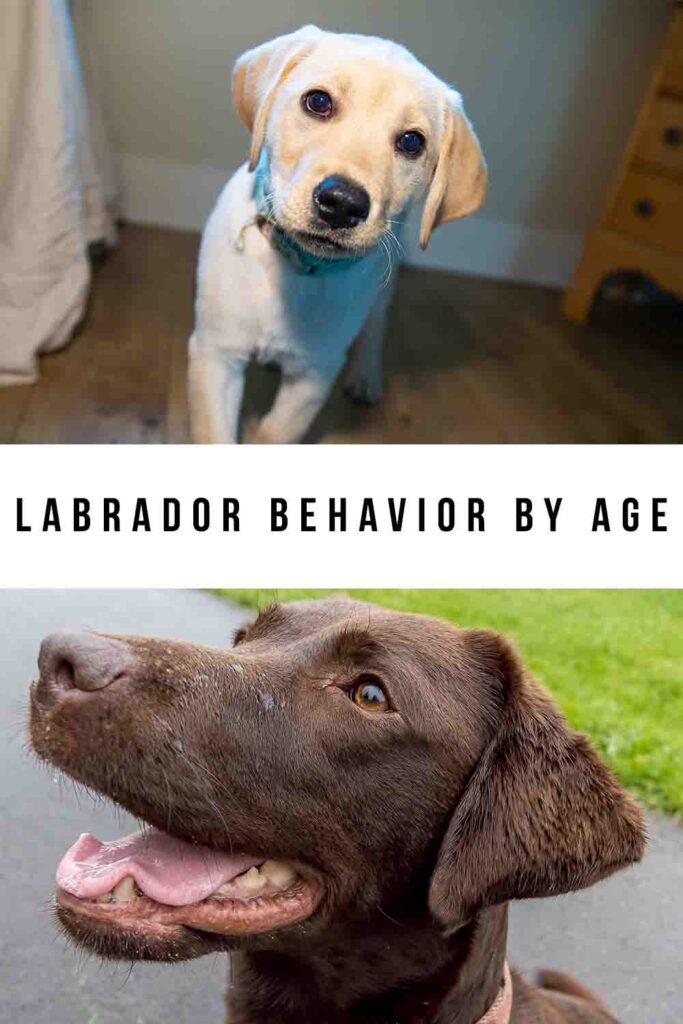[ad_1]

When my first dog was an unruly puppy, a Labrador owner told me that the onset of adolescence would be worse. Then that he’d improve quite a lot at a year old, and fully settle down at three years old. It wasn’t really what I wanted to hear at the time. But with hindsight I can kind of see their point. In fact, whilst there will always be exceptions that prove the rule, there are also some reliable patterns of Labrador behavior by age. Puppies will be attention seeking and need lots of management. Adults will be active, friendly and easy-going. And seniors will start to slow down and show signs of old age. Here’s a year-on-year guide to what to expect from your Lab as they grow up.
Contents
The development of Labrador behavior
Just like our own lifetimes, Labrador’s lives are characterized by distinct periods – infancy, adolescence, adulthood and old age. Of course, it all happens much faster in them though, because they pack it all into and average of just 12 or 13 years. You’ve probably heard the adage that one human year is worth 7 dog years. But the rate at which they mature (and their behavior changes with age) isn’t uniform. A more accurate way to think about it is like this:
- The first 6 months of a puppies’ life is roughly equivalent to the first 10 years of a human child’s life.
- Between 6 and 12 months old, they will enter adolescence.
- At a year old, they are a mature adolescent.
- Sometime between 2 and 3 years old they become physically and mentally mature.
- And at 9 years old, they start to become seniors.
Labrador behavior by age: the first 6 months
Infant Labradors are champion nappers, attached to their primary carer to the point of clinginess, playful, and impulsive.
Sleep patterns
Young Labrador puppies are growing and learning fast, and they need a lot of sleep to support their development. However, it’s likely they’re still waking up in the night, or at least getting up early in the morning, in order to pee. So, they make up for it by napping frequently during the day. Which is alright for them, even though it can be cripplingly tiring for us! But hang in there – most puppies are sleeping through the night at 14 weeks old. After that they will gradually start waking earlier in the morning too.
Clinginess
Infant Labs are often described as ‘velcro puppies’. It’s highly likely that they’ll want to be close to you at all times. There is a double whammy of reasons for this. Firstly, they are instinctively aware that they are still too small and vulnerable to survive alone. So they know it’s in their best interests to stay close to you, and make sure you don’t forget about them. Secondly, Labradors have been bred over many generations to be innately people-focussed, since dogs who were naturally motivated to remain close to their owners made better workers.
Playfulness
Labrador puppies spend more time playing than at any other time in their lives. But lots of first time puppy parents are taken aback by exactly how ferocious puppy play behavior can be! Barking, growling, lunging, pouncing, and biting are all completely normal elements of puppy play. In the wild, they would be valuable practice for hunting in future, and the natural instinct to start practicing early lives on, even this long after domestication.
Impulsiveness
Puppies of all types are generally a chaotic presence. They have very little impulse control, so they rarely sit still for long, and they cannot resist temptation. It’s up to us to manage their environment so that this doesn’t become a problem. For example, don’t wait for them to start playing with shoes, then try and teach them not to. Make sure those shoes are kept out of reach in the first place, and give your puppy plenty of suitable toys instead.

The sweet spot
There is a point when a Labrador puppy is roughly akin to an 8 year old child. They sleep well, use the toilet in the right place, understand instructions, and hang off your every word. Enjoy it while it lasts, but don’t get complacent that your training is over, because puberty is just around the corner. A whole new stage of Labrador behavior is coming!
Labrador behavior by age: adolescence
Labradors’ adolescent period is characterized by becoming more bold, confident, and independent. If we think of it in terms of their wild ancestors again, they are no longer so vulnerable and reliant on the protection of adults around them. And time to start thinking for themselves, in anticipation of being an self-sufficient adult soon.
You might start to discover that the little puppy who never left your side off the leash will suddenly cross soccer fields to say hello to another dog. And that when you try to call them back, they’ve gone deaf to the recall cue which worked so reliably a couple of weeks ago. These are all normal parts of growing up. During this stage, you need to protect your cues by not using them when your dog is likely to ignore you, and manage their opportunities to make unwanted decisions instead. For example, by using a long line, or exercising them in a secure field.
Adolescence is also associated with the onset of sex differences in behavior. For example, unneutered male dogs tend to carry out more scent marking than either spayed or intact females, or neutered males. And unspayed female dogs will start going into heat every 6 months or so.
The secondary fear period
Some adolescent Labradors also go through what’s known as a secondary fear period. As they become more independent, and stop relying on others to look out for them, they instinctively become more cautious about new and unfamiliar things as well. In the wild, it’s a tried and tested survival adaptation. But it can be frustrating to deal with if it also means they start becoming reactive in situations when they previously weren’t. If this happens, the key is not to push them to handle more than they are comfortable with – given them space, and and gradually restore they emotional response to a positive one using treats.
Labrador behavior by age: adulthood
By the time your Labrador is 2 or 3 years old, their physical and emotional journey to adulthood is complete. Hopefully, if you socialized them carefully as a puppy, and trained them consistently until now, they have become all the things you dreamed of. And at last, they have reached a point where if you treat them consistently, their behavior will remain consistent too.
The Labrador breed is famous for being friendly and easy company. They are exceptional at learning and remembering new cues, and famously food motivated, so teaching and maintaining good manners should be straightforward. They have lots of energy and stamina, so they’re great buddies for running, hiking or cycling with. But without enough exercise they might resort to unwanted behaviors such as chewing furniture, barking or digging in the garden.
Factors which will affect the behavior of your mature adult Labrador include:
- The temperament of their parents
- Socialization they received as a puppy
- Training
- How much physical exercise they get
- How much mental stimulation they receive
- Diet
- How much time they spend alone
- Health factors
- Positive and negative experiences
An example of how health factors and experience can affect behavior is if a Lab experiencing joint pain from hip dysplasia is jumped on by a playful younger dog. This could make them reactive towards encounters with other dogs in future, because they want to warn off another potentially painful experience.
Labrador behavior by age: the senior years
In veterinary terms, Labradors are considered senior from roughly 9 years old onwards. However, many Labs remain active long past this point. The average retirement age of Labradors working as gundogs is 10 years old, and this is more likely to be due to physical factors such as arthritis or deafness than not being mentally up to the job any more.
There’s no reason why old age alone should change a Lab’s behavior. But, old age is associated with a broad range of physical changes, and increased likelihood of illnesses, many of which can cause behavior changes. For example
- Senior dogs are more likely to be diagnosed with diabetes, and are less able to fight off infections like UTIs. Which means their toilet habits might change, including needing to get up in the night to pee again.
- Sensory changes such as sight and hearing loss mean they might become less responsive to your cues, or less confident in unfamiliar situations.
- Physical changes like loss of muscle mass and degeneration of their joints means they might slow down, and be less interested in things they used to enjoy, like walks or playing fetch.
- The older they get, the more likely dogs are to show signs of canine cognitive dysfunction (CCD), which his akin to dementia in humans. CCD may include behavior changes such as night waking, forgetfulness, and becoming disorientated.
Take your senior dog for regular veterinary checks to help manage these changes, and for practical advice on making their golden years as comfortable as possible.

Labrador behavior by age – summary
Labrador behavior by age can be viewed in terms of four distinct periods – puppyhood, adolescence, adulthood and senior years. Adulthood is the easiest, and (thankfully) the longest too! Whilst all the other stages present their own unique challenges, they are just that – stages, which will pass. Knowing what to expect makes them easier to manage, and realizing they are transient helps us appreciate the privilege of spending a lifetime with our Labs.
Let us know how your Labrador’s behavior changed over their lifetime using the comments box down below. Have you got any tips for surviving the puppy and adolescent stages? Or for making their senior years

The Labrador Site Founder

Pippa Mattinson is the best selling author of The Happy Puppy Handbook, the Labrador Handbook, Choosing The Perfect Puppy, and Total Recall.
She is also the founder of the Gundog Trust and the Dogsnet Online Training Program
Pippa’s online training courses were launched in 2019 and you can find the latest course dates on the Dogsnet website
[ad_2]
Source by [author_name]



